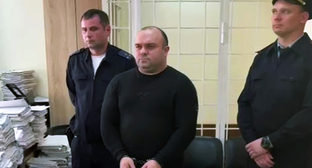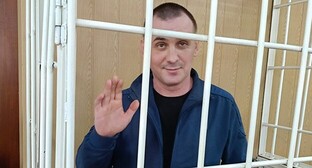09 November 2009, 23:00
Week in the Caucasus: review of main events of November 2-8
Another incident looking like an attempt on the opponent of Chechen President Isa Yamadaev; situation with human rights and freedom of speech in Azerbaijan; propagation of swine flu in the Caucasus; progress in investigating the murder of well-known advocate Stanislav Markelov; and video complaints of militia major of his bosses to Russian prime minister Putin, which have stirred up the Internet, - look up these and other events in the review of the week of November 2-8 in the Caucasian regions prepared by the "Caucasian Knot".
"Road accident-attempt" on Isa Yamadaev
At night on November 2, in the Mozhaisk Highway in a Moscow suburb Isa Yamadaev's Mercedes S600 made a head-on crash with a Nissan Almera, where the driver was in the state of alcoholic intoxication.
The passenger of the Nissan died, and its driver in coma and with heavy traumas was brought to the of Odintsovo. Isa Yamadaev survived only due to his armoured car.
The driver of the Nissan was found to be the guilty party of the accident: he suddenly drove out into the opposite traffic lane.
Mr Yamadaev has not excluded that the accident was not occasional. "We thought at once that they'll open fire, and that it was an attempt. If a skilled expert had searched the best place for an attack, the one of the accident would have been ideal," he said.
Isa's relatives stick to the same opinion. "The road accident, where Isa got, was hardly just an occasion," a close Yamadaev's relative said to the "Caucasian Knot" correspondent. "Look, the Nissan went to the counter lane right in front of Isa's car and ran into it at full speed. If his Mercedes had been an ordinary car he would have never survived in a head-on crash. That is, it was an attempt on his life."
When asked about how the driver of the Nissan could go such action, not being sure that he would survive in the head-on collision, the relative supposed that the organizers of the possible attempt could not know that Isa Yamadaev's car was armoured. However, he emphasized that it was only his personal opinion.
The relative also added that literally in a couple of minutes after the road accident with Isa, several passenger cars with license number plates of the Chechen region appeared in the venue. "It's clear that it could not be just a coincidence; surely, Isa was shadowed," he has concluded.
"Frozen" freedom of information and alternative report on torture in Azerbaijan
On November 3, the International journalists' organization ARTICLE 19 held a presentation, at the Baku-based Media Centre, of its report on the state of things in the sphere of the freedom of obtaining information in Azerbaijan. The report under a meaningful title "Time to Reset Code Locks" covers a four-year period (2005-2009).
Nathalie Losecoot, coordinator of the project and senior programme officer of the organization, noted that the project was implemented together with the journalistic association "Yeni Nasil" (New Generation) and the Institute of Media Rights (IMR) with the aim to study the state of things with the freedom of information in Azerbaijan. The project covered Baku, Gyandzha and Sumgait and studied the issue of getting answers to information requests addressed to state bodies.
"We wanted the existing law on the freedom of obtaining information not to remain on paper but come into force," said Ms Losecoot. According to her story, the law as such is "rather positive". However, it lacks enforcement mechanisms.
Ms Losecoot noted that Azerbaijan has "widespread practice not to give answers to requests." According to her story, even if a rejection is provided, there should be a clear motivation with references to the articles of the law.
Besides there is no "mechanism of openness of the laws to the public," the expert said. Although, as she added, "the people themselves are not always persistent in requesting information."
Ms Losecoot also criticized the fact that Azerbaijan still has no Information Ombudsman, although he should have been appointed back in 2006.
The study also revealed the absence in Azerbaijan of differentiations between the functions of information departments and press services.
As a whole, by summing up the results of the 4-year monitoring, the officer of ARTICLE 19 said no "serious progress" could be noticed during the surveyed period in the sphere of the freedom of information.
On that very day, the Human Rights Centre of Azerbaijan, headed by a well-known human rights activist Eldar Zeinalov, presented to the UN Committee Against Tortures its 20-page alternative report on fulfilment by Azerbaijan of the UN Convention Against Torture.
The Centre offered 24 recommendations on how to remedy the situation with torture in Azerbaijan. The legislative measures include correction of the definition of torture in the Criminal Code, introduction of the procedures to enforce the decisions of the UN Committees and compensation to all victims of torture (not only to those acquitted from criminal charges) into the national legislation, admittance of independent medical examination in the cases related to torture, etc.
The alternative report was already accepted by the UN Committee Against Torture and is available in the Internet in the English language.
In his turn, Elchin Bekhbudov, head of the Azerbaijani Committee Against Torture, told the "Caucasian Knot" correspondent that this year's torture count is on the rise. The Committee has already received over 90 applications. Besides, 6 fatal cases as a result of torture have been registered; and in three of them people were incited to suicide. Last year, the count was 81 facts of torture, including 3 fatal.
"Medical diplomacy" between Abkhazia and Georgia
The agreement on free transportation of patients across the Georgian-Abkhazian border to the hospitals located in the territory, controlled by Tbilisi, was reached on November 3 at a meeting within the mechanism on incident prevention in the conflict zone. This was announced by Shota Utiashvili, head of the information-analytical department of Georgia's MIA.
"We were promised that patients would meet no barriers at the administrative border," said Levan Tevzaya, adviser of the chairman of the government of the Abkhazian Republic. According to Mr Utiashvili, "earlier there were problems with transporting patients to hospital."
Propagation of swine flu over Caucasus
On November 4, in Azerbaijan, a woman, citizen of the country, was hospitalized with diagnosis of A/H1N1 infection. She returned to Baku on November 3 from the Ivano-Frankovsk Region of Ukraine.
This is the third swine flue case in Azerbaijan from the beginning of pandemia. Earlier, in the end of July, the A/H1N1 virus was revealed in two citizens of Azerbaijan - a woman and a boy of 14, who came back from Great Britain and France. Both of them were hospitalized and successfully cured.
Earlier this week, Armenia could not exclude a threat of penetration of the disease into the country have not excluded in Armenia. "From the medical viewpoint, the situation is somewhat strange: all the Armenian neighbours register many swine flu cases, but Armenia - none. It's hard to say for how long this situation will last, and whether Armenia will escape the infection," said the country's chief infection physician.
It was not too long to wait. At the moment of writing this material, the country fixed a suspicious case of virus infection. The virus symptoms were registered directly at the "Zvartnots" Airport, from where a suspicious patient was sent to the "Nork" infectious hospital.
As of November 5, Kalmykia registered 30 swine flu disease cases: in Elista - 27 cases, one case in the Iki-Burul and two cases in the Tselinny Districts. A source from the regional department of "Rospotrebnadzor" (Federal Agency for Consumer Supervision) emphasized that "there were no grave cases."
This week, a highly-pathogenic ?/?1N1 virus was revealed in a resident of the Prigorodny District of North Ossetia, who on October 30 arrived from Kyiv. After August, it already the third swine flu case in the republic.
"First of all, the risk group includes children and elderly people. The swine flu runs riot already in 140 countries of the planet. The World Health Organization declared pandemia of A/H1N1 virus. Whenever and wherever possible, try not to go abroad, plan your rest in Russia and strengthen your immunity by special preparations and traditional folk methods," said Mr Butaev, chief sanitary physician of the republic.
It became also known by Thursday that the Rostov Region registered 17 A/H1N1 cases, confirmed by laboratory studies; nine of these patients arrived from abroad.
According to the "Rospotrebnadzor" Department for Dagestan, as of November 5, 12 swine flu lab-confirmed swine flu cases were revealed. By his decision, the chief state sanitary physician of the Republic of Dagestan closed for quarantine a number of classes at schools and groups at higher educational institutions.
On November 7, the first case of ?/H1N1 was registered in the Astrakhan Region. The disease was diagnosed in a member of the Volgograd KVN (Club for Light-Headed and Quick-Witted) team, which came to Astrakhan for participation in the inter-regional KVN league "Kaspii".
Hunger strike for exclusion: two Georgians stay for several months in Archangelsk reception centre
Citizens of Georgia Nodar Nikoleishvili and Davis Khubunaya, kept at the special reception centre for those punished for minor offences in the city of Archangelsk, pending exclusions out of Russia, went on hunger strike demanding to accelerate their exclusion and create decent custody conditions for all the detainees.
Mr Nikoleishvili's application addressed to the Human Rights Centre (HRC) "Memorial" runs that he has been kept in the facility for the fifth month, and his cell "has little differences from a dungeon."
"The total floor area is less than six square meters; the cell is in twilight, as the daylight can't pass through the window leaves, which are covered with glass blocks; the walls are coated with the so-called 'indelible fur coat' full of dust and bacteria. The toilet of the 'direct fall' design, that is, just a hole in the floor, located 80 centimetres from a dining table," wrote the citizen of Georgia.
According to his story, the detainees sleep on wooden decks, directly under which (15 centimetres away) there are floor heating devices emitting electromagnetic radiation; the consequences are permanent headaches and bad health condition of inmates. Cells lack electricity sockets, TV-sets, bedside-tables for storing food and clothes and a refrigerator.
"We can only stand or lie in the cell, and we spend 23 hours per day in such postures, plus a one-hour walk. Our utensils are aluminium cup, spoon and plate, which are given out at lunch and taken away after supper. Instead of breakfast - a cup of boiled water; the food is always cold. In the rest of the time - only cold water from the tap," Mr Nikoleishvili wrote.
According to his story, it is forbidden to keep tea, coffee, salt, pepper, shaving tools, watches, belts, boot laces, needles and threads and mirrors in the cells; believers cannot were their crosses; it is forbidden to keep relatives' photos.
Nodar Nikoleishvili says in his application that under the ruling of the court he should have been excluded within one month. He also notes that his fellow citizen Khubunaya is kept in the reception centre of Archangelsk since October 1, 2009.
Sergey Safronov, senior inspector for special missions of the Russian DFMS (Department of the Federal Migration Service) for the Archangelsk Region, said that Nikoleishvili and Khubunaya had been kept in the reception centre for so long because the Georgian party delays presentation of documents required for exclusion.
According to Svetlana Gannushkina, chair of the Committee "Civil Assistance" and a member of the board of the International Human Rights Centre "Memorial", under the Russian legislation the detainees can stay at the reception centre for a year, unless the Georgian party accelerates the exclusion process.
Investigation into Markelov's and Baburova's murders: nationalists under suspicion
On November 3, Evgenia Khasis, a manager of the LLC "Bukhuchyot i Torgovlya" (Accounting and Trade), and unemployed Nikita Tikhonov were detained on suspicion of murdering advocate Stanislav Markelov and journalist Anastasia Baburova. On November 5, they were arrested.
Under the inspectors' version, Khasis and Tikhonov killed the advocate for his defending the interests of antifascists and victims of nationalists at trials. According to the official version, right before the murder, the girl was shadowing Markelov and Baburova and informing her partner about their travel. The young man caught up with them and opened fire from his pistol; then he managed to disappear in the metro.
Both the arrested persons, according to the investigation, stick to radical nationalistic views. It was initially reported that once they were members of the Russian National Unity (known as "RNE"). However, the leader of this now forbidden organization Alexander Barkashov assured, through his advocate, that "the RNE never killed or kills anyone." Barkashov also noted that he was not acquainted with the defendants.
On November 6, in the context with Markelov's case in Moscow Ilya Goryachev, one of the leaders of the nationalistic organization "Russian Image", was detained. Law enforcers conducted a search in the office of the organization. Later, information appeared that Goryachev was released.
Militia Major from Novorossisk tells Putin by Internet about outraged militia bosses
On November 6, Militia Major Alexei Dymovskiy from Novorossisk (Krasnodar Territory) placed in the website dymovskiy.ru his video appeal to Vladimir Putin, telling about numerous malversations of militia bosses, in particular, of the heads of the city UVD (Interior Department). The Major asked Premier Putin about a personal meeting.
Polina Gerasimova, inspector on mass media of the Novorossisk UVD, said that today all Dymovskiy's colleagues in the criminal search gathered for a meeting and spoke against the Major's act.
According to her story, "operative officers serve not for money but by the call of their life mission." "This was noted today by all employees of the criminal search division who condemned Dymovskiy's act," Ms Gerasimova has emphasized.
"Probably, everything what the Major says is the truth. In this situation, both militia bosses and country leaders as a whole are guilty," said Mikhail Pashkin, Chairman of the Coordination Board of the Moscow militiamen's trade union.
On the order of Rashid Nurgaliev, Minister of Internal Affairs, after Dymovskiy's video appeal, a working group was formed in the GUVD for the Krasnodar Territory to conduct a check. This was reported by Vladimir Grebenyuk, acting head of the Novorossisk UVD, who stated that the facts reported by Alexei Dymovskiy were not confirmed and accused him of slander.
On November 8, Militia General-Lieutenant Sergey Kucheruk, head of the GUVD for the Krasnodar Territory, made a decision to dismiss Alexei Dymovskiy.
Mr Dymovskiy said that he was afraid for his and his family's safety, since after his resonant video appeal he felt pressure from militia bosses.
Russian human rights activists and the Public Chamber, as well as the trade union of Moscow militia, have expressed their readiness to take the disfavoured Major under protection.





Комментирование через Кавказский узел